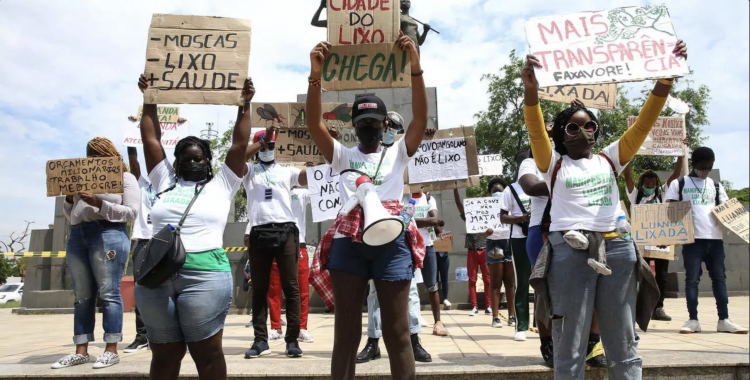"This is a cry for help against the situation we live in," shouted Israel Campos, one of the organizers of the demonstration shortly before 13:00, when the young people concentrated in the Largo das Heroínas began the parade towards the Largo 1.º de Maio, one of the emblematic squares of Luanda where many of the marches organized in recent times have ended.
Unlike more recent protests, marked by acts of violence between police and demonstrators, on Saturday everything took place in a calm and orderly manner, with the organization requesting compliance with the social distance between the small group.
The scant mobilization did not, however, deter the young people who called for the protest and who were more concerned with the cause than with the number of participants.
Wearing T-shirts with the slogans "Luanda Lixada", the young people also expressed through homemade posters the concerns that have afflicted the municipalities of Luanda in recent months in the face of accumulated garbage, forcing the President to create last week, an emergency inter-ministerial committee to deal with the problem that has left the governor Joana Lina under increasing pressure.
"A dirty house says a lot about the owners", "Luanda: City of Garbage", "The Angolan people are not garbage" or "Less flies, more health" were some of the phrases displayed on the posters.
For journalist Israel Campos, 21 years old, this is a problem that substantially affects public health.
"We have many people in hospitals suffering from diseases like malaria, typhoid, etc., because of the mosquitoes, the rain, and the garbage," he noted.
Health Minister Silvia Lutucuta, who sits on the inter-ministerial committee, admitted last week that poor hygiene could trigger a cholera outbreak, and doctors have been reporting increased cases of diarrhea and gastroenteritis in hospitals.
"We want to call the attention of our authorities to find a sustainable way to solve the garbage problem," instead of palliatives, Israel Campos told Lusa, stressing that the management of the country has to be decentralized and that the resolution of problems cannot always go through the President of the Republic.
The problem of garbage has been dragging on since December, when the Provincial Government of Luanda suspended contracts with six operators for inability to pay a debt that amounted to more than 300 million euros.
In February the President, João Lourenço, authorized the expenditure for an emergency tender for cleaning services and, in March, it was announced that seven new companies would ensure waste management. However, the alleged lack of experience and technical capacity of the new operators, as well as the lack of transparency of the tenders has been questioned.
"Flies, lots of flies everywhere," said Tchissala Figueiredo regarding one of the most visible impacts in the capital of the mountains of accumulated garbage, which is also reflected in an increase in diseases.
"That is a big concern, what is going to be the public health impact with the garbage that has been accumulating," the 21-year-old student pointed out.
Tchissala Figueiredo wanted to participate in the march to show her "dissatisfaction with the poor management of solid waste in Luanda," pointing out that the problem is not a recent one.
"It is inconceivable that until today we can not give an answer to this. When the world is already focused on solving ecological problems, we are still focused on whether they will collect the garbage or not. This is ridiculous," he said.
About the clean-up triggered since the interministerial commission entered the field, he said that some differences are already being felt, but it depends a lot on the neighborhoods where you live.
"Now it bothers more because there is a lot of garbage in the city, but in the periphery there has always been garbage, Luanda has never been a clean city," lamented Tchissala Figueiredo, asking for "long-term solutions."






